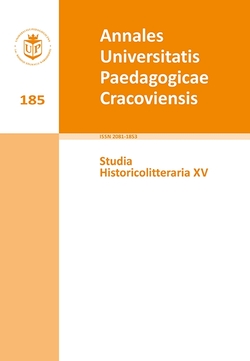Czarny humor w twórczości Władysława Szlengla ze szczególnym uwzględnieniem wiersza „Mała stacja Treblinki”
Main Article Content
Abstract
Black humor in Władysław Szlengel works, with particular focus on Mała stacja Treblinki (A small station called Treblinki)
Władysław Szlengel (1914-1943), was a Jewish poet writing in Polish. His works are the best example of the use of black humor in Polish poetry of World War II. War caused him to change his worldview, which is reflected in the change of humor in his works. The shift was so powerful that in fact Szlengel-commentator replaced Szlengel-satirist. He did not hesitate to use the sharpest irony both against his enemies and against other victims of the system. His poem A Small Station Called Treblinki is the most shocking instance of black humor.
Key words: Władyslaw Szlengel; black humour; holocaust; humour; risus sardonicus;
Downloads
Article Details

This work is licensed under a Creative Commons Attribution-NonCommercial-NoDerivatives 4.0 International License.
COPYRIGHT POLICY
The publisher of "Annales Universitatis Paedagogicae Cracoviensis.Studia Historicolitteraria" is authorised to use and distribute all the materials published in the journal on the basis of a non-exclusive licence agreement unlimited in time – previously concluded for an indefinite period of time each time with the author of a specific paper in the fields of exploitation specified in the agreement.
OPEN ACCESS POLICY
"Annales Universitatis Paedagogicae Cracoviensis.Studia Historicolitteraria” is an open access journal, and all its contents are available for free to users and/or their institutions on the basis of non-exclusive licenses under Creative Commons (CC BY CC-BY-4.0). Users can read, download, make copies, distribute, print, search, or to link to full text articles in this journal without the prior permission of the publisher or the author.This is consistent with the definition of open access BOAI (http://www.soros.org/openaccess).
References
Bocheński T., Czarny humor w twórczości Witkacego, Gombrowicza, Schulza: lata trzydzieste, Kraków 2005.
Borowski T., Proszę państwa do gazu, [w:] T. Borowski, Wspomnienia. Wiersze. Opowiadania, Warszawa 1981.
Brottman M., Risus Sardonicus: Neurotic and pathological laughter, „Humor: International Journal of humor Research” 2002, vol. 15–4.
Główczewski A., Komizm w literaturze. Studia w perspektywie komunikacyjnej, Toruń 2013.
Gryszkiewicz B., O czerni czarnego humoru, [w:] Zbliżenia historycznoliterackie. Prace ofiarowane Stanisławowi Burkotowi, red. A. Gurbiel, M. Buś, T. Budrewicz, Kraków 2003.
Gryszkiewicz B., Peklowana baronowa, czyli o „czarnym” humorze Konstantego Ildefonsa Gałczyńskiego, [w:] Dzieło i życie Konstantego Ildefonsa Gałczyńskiego, t. 1, red. A. Kulawik, J. S. Ossowski, Kraków 2005.
Himilsbach J., Moja oszałamiająca kariera, Kraków 2004.
Polski Słownik Biograficzny, t. XLVIII/3, z. 198, Warszawa 2012.
Szlengel W., Co czytałem umarłym, Warszawa 1979.
Szlengel W., Poeta nieznany. Wybór tekstów, Warszawa 2013.
Zarys teorii literatury, red. M. Głowiński, J. Sławiński, Warszawa 1986.
Tuwim J., Wiersze wybrane, Wrocław 1986.
Wiston M., Humour moir and Black humor, [w:] Veins of humor, red. H. Lerin, Massachusetts 1972.
